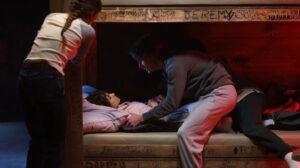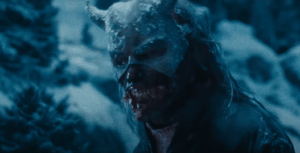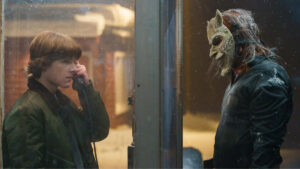Publication Date: 10-27-2025
Black Phone 2 (2025) review
Dir. Scott Derrickson
By: Steve Pulaski
Rating: ★★★
A sequel to the surprisingly chilling and effective horror movie The Black Phone was always going to elicit skepticism. Beyond the fact that the title “Black Phone 2” is almost as clunky as Taken 2, the source material began and ended with a sub-50 page short story by Joe Hill, but when a standalone horror movie makes an upwards of $150 million at the box office, what is a studio expected to do besides scramble to form a follow-up?
There are a couple things to note with Black Phone 2. For one, this film doesn’t try and make the Grabber (Ethan Hawke) — the masked kidnapper, who was killed at the end of the original — as crafty as John Kramer. This sequel doesn’t resort to showing the traps he laid and the plans he made prior to his death. Furthermore, it’s worth noting that Scott Derrickson — who directed Sinister, Deliver Us from Evil, and the original Black Phone — is back in the director’ chair for this sequel. After all, he opted out of directing Sinister 2. Something is not everything, but everything is something.

Set in 1982, a few years after Finney (Mason Thames) emerged as the only survivor (and killer) of the notorious kidnapping psychopath known as “the Grabber,” we are reacquainted with the family, who is still understandably overwhelmed with trauma. The teenage Finney has no friends, is prone to bouts of violence, and numbs himself by chainsmoking joints. Try as he might, he can’t help but answer the out-of-order ringing payphones that cross his paths on a regular basis.
Meanwhile, it’s his sister, Gwen (Madeleine McGraw), who is experiencing horrifying visions of children trapped under frozen lakes, carving letters into the ice as a way to communicate obscure messages. On occasion, a phone rings in her nightmares, and it’s a younger version of her mother, who committed suicide, on the other end. She informs her daughter of the similar visions she experienced, which prompts Gwen, Finney, and Gwen’s boyfriend, Ernesto (Miguel Mora), to attend a winter camp at Colorado’s Alpine Lake, where mom once worked.
The trio arrive at the camp in the dead of winter, as a worsening blizzard has blanketed the area, rendering a supervisor (a fatherly Demián Bichir), his niece (Arianna Rivas), and two other employees as the only ones on the property. Most nights, a dormant payphone that sits on the property rings, and whether it’s Finney or Gwen who ultimately answer the call, they are fed information that could be used to take down the Grabber.

So few non-Christmas horror movies are set in snowy tundra. Much like its predecessor, with dream sequences shot on film (Super 8mm for scenes absent of dialog; 16mm for those featuring spoken words), Black Phone 2 reminds you the tangibility of cinematic settings when they’re presented in their grainy glory. Such a technique makes Alpine Lake feel like the arctic, especially with lengthy stretches set on frozen ponds with questionably stable ice beneath the characters’ feet. Dimly lit interiors animate the film-grain and give it an unpolished appearance that has long been absence with the advent of digital photography. Like the original, Black Phone 2 retains the visual character and feels like a picture made decades in the past.
Black Phone 2 dares push the story in the future, even after the Grabber is deceased. Derrickson and co-writer C. Robert Cargill of course take a lot of inspiration from the Nightmare on Elm Street series, and essentially position Ethan Hawke’s personification of evil as a Freddy Kreuger figure capable of thriving on the strength of fear, and operating on the canvas of potential victims’ dreams. Before you bristle, recall that the original Black Phone had a number of supernatural elements, including Finney’s visions of the Grabber’s victims. It also helps that Derrickson and Cargill understand that thematic heft behind the best Nightmare films, such as the second sequel, Dream Warriors. They understand how to present these ideas from a writing and visual standpoint.

Consider a sequence where Finn answers a call from the Alpine Lake Camp phone booth. Derrickson’s camera begins by claustrophobically placing us inside the booth with Finney, and then begins to pull back to show us the snowy terrain engulfing him. Soon, the displaced souls of the boys on the phone with Finney turn up at a distance, Derrickson’s camera slowly panning, eventually circling, to capture them all. Derrickson can turn something as seemingly passive as a scene of a character taking a phone call into a full-blown event.
Such sequences too take advantage of cinematographer Pär M. Ekberg’s talents. There’s another extended sequence set in the camp’s kitchen, involving a sleeping Gwen, that recalls the best of Wes Craven’s franchise, and by this point, there is enough equity established in the story to usurp the idea that this is simple mimicry. Scott’s son, Atticus, also deserves credit for his score, which really apexes during a dream chase-scene involving Gwen and the Grabber.

This is due to Derrickson and Cargill spending a great deal of time (but not too much) on the interpersonal relationships of the youthful trio. Sure, Gwen has far too many vulgar Gen-Z quips — insults such as “sanctimonious twat” or “rotten shit-stain” really lose their luster when the next one feels like an attempt to outdo the last one — but the relationship she shares with Ernesto has all the hallmarks of the awkward teen romance that is no less underscored by genuine care. So much of the first act is dedicated to reintroducing us to these characters after significant time apart that we not only get to see the maturation of Finney and Gwen, but also the acting talents of Thames and McGraw, respectively.
Black Phone 2 gets you to feel the frigidity of its snow-covered setting all while establishing both dread and intrigue. It’s one thing for a horror movie to get you to feel uneasy. It’s another for it to take the slowburn approach, offering you sparse dialog, scenes that end just a tick earlier than you expect, and reward your patience with a memorable third act, despite a story that yet again dials up the trauma angle. While watching a sequel for which I had lukewarm expectations, I was genuinely surprised at the emotional wallop Black Phone 2 packed. Just as the weather begins to get cold in many states across America, here’s a film that’s an appropriate complement, no Christmas lights necessary.
Starring: Mason Thames, Madeleine McGraw, Miguel Mora, Ethan Hawke, Demián Bichir, Arianna Rivas, Jeremy Davies, Anna Lore, Graham Abbey, Maev Beaty, and James Ransone. Directed by: Scott Derrickson.
About Steve Pulaski
Steve Pulaski has been reviewing movies since 2009 for a barrage of different outlets. He graduated North Central College in 2018 and currently works as an on-air radio personality. He also hosts a weekly movie podcast called "Sleepless with Steve," dedicated to film and the film industry, on his YouTube channel. In addition to writing, he's a die-hard Chicago Bears fan and has two cats, appropriately named Siskel and Ebert!


